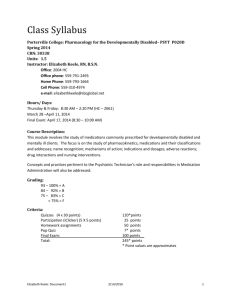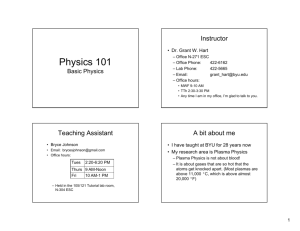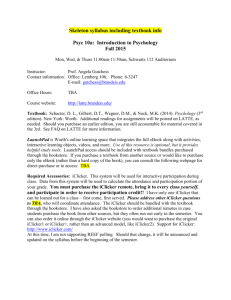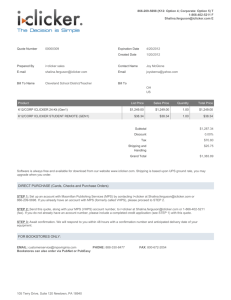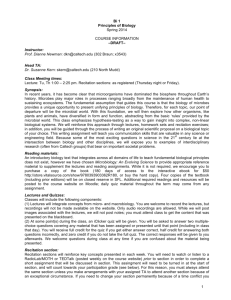Syllabus Spring 2015 - Porterville College
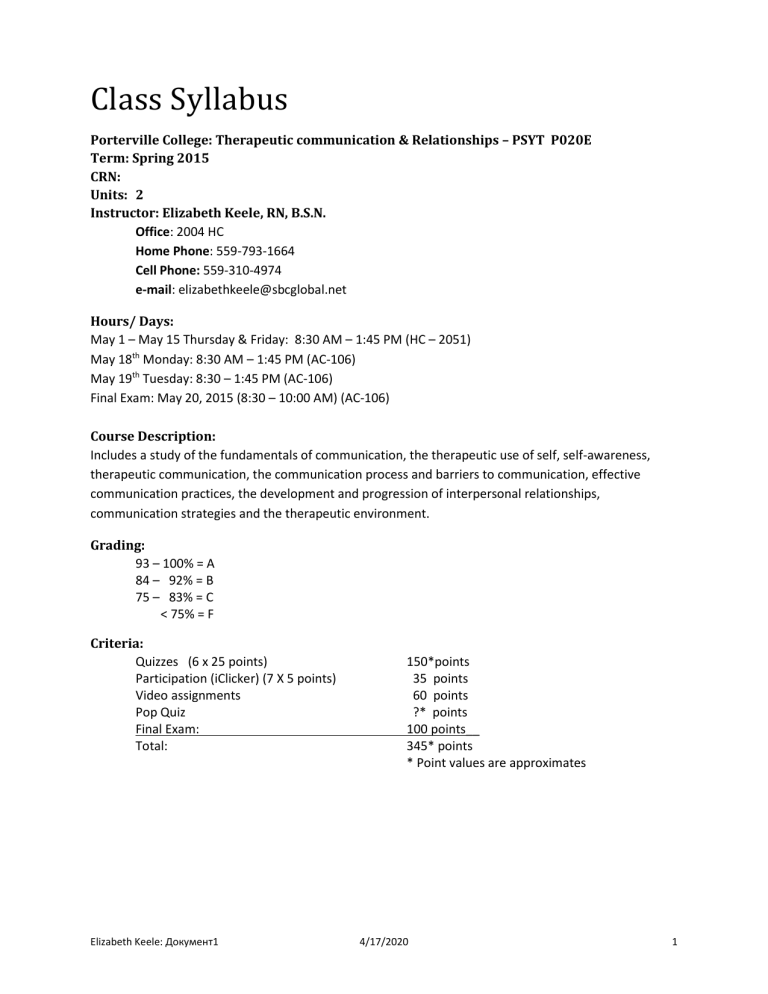
Class Syllabus
Porterville College: Therapeutic communication & Relationships – PSYT P020E
Term: Spring 2015
CRN:
Units: 2
Instructor: Elizabeth Keele, RN, B.S.N.
Office: 2004 HC
Home Phone: 559-793-1664
Cell Phone: 559-310-4974
e-mail: elizabethkeele@sbcglobal.net
Hours/ Days:
May 1 – May 15 Thursday & Friday: 8:30 AM – 1:45 PM (HC – 2051)
May 18 th Monday: 8:30 AM – 1:45 PM (AC-106)
May 19 th Tuesday: 8:30 – 1:45 PM (AC-106)
Final Exam: May 20, 2015 (8:30 – 10:00 AM) (AC-106)
Course Description:
Includes a study of the fundamentals of communication, the therapeutic use of self, self-awareness, therapeutic communication, the communication process and barriers to communication, effective communication practices, the development and progression of interpersonal relationships, communication strategies and the therapeutic environment.
Grading:
93 – 100% = A
84 – 92% = B
75 – 83% = C
< 75% = F
Criteria:
Quizzes (6 x 25 points)
Participation (iClicker) (7 X 5 points)
Video assignments
Pop Quiz
Final Exam:
Total:
150*points
35 points
60 points
?* points
100 points__
345* points
* Point values are approximates
Elizabeth Keele: Документ1 4/17/2020 1
Office Hours:
Thursday & Friday 11:45 – 12:45
By appointment 2004 HC Phone: 559-793-1664
You may e-mail me at elizabethkeele@sbcglobal.net
(if I do not reply within 24 hours, please call me)
I am also available by phone at 559-793-1664 -Please do not call after 10:00 PM or on Sundays (except in an emergency)
Web Site: http://home.portervillecollege.edu/ekeele/ or go to go to www.portervillecollege.edu
and go to the instructors web sites and click on Elizabeth Keele. You may obtain power point presentation, handouts and class syllabus on-line.
Textbook / Supplies:
Psychiatric Nursing 6 th edition
Davis’s Drug Guide 13 th edition
Taber’s Encyclopedia Medical Dictionary 21 st edition
iClicker
Scan-tron form #882-ES (approximately 7)
Quizzes & Tests:
A quiz, test or work-sheet will be given on a daily bases. Please bring a scan-tron form #882-ES to all quizzes and tests. Tests and quizzes are timed at 1 minute for each question. Quizzes and tests are based on reading and lecture notes. The opportunity to make up one missed exam will only be allowed if the student informs the instructor prior to the scheduled exam. Pop quizzes may not be made up.
Some quizzes will be administered using the iClicker, you must bring it to class daily. If you arrive late to class during a test or failure to use a scan tron will result in a 10% drop in the test score.
Quizzes are based predominantly on the subject matter that was taught in the most resent previous lecture, however they may include information from earlier lectures. The Final Exam is cumulative from
Day One.
Students will not be allowed to retake any exam or quiz on which an unsatisfactory grade was earned.
Students may make arrangement with the instructor to review an individual exam up to two (2) weeks after the exam is returned. The final exam will not be reviewed in class.
All cell phones, pagers, and/or electronic device must be turned OFF during exams/quizzes unless prior arrangements are made with the instructor. Electronic devices other than a calculator may not be used for in-class calculations work (ie. Cell phones, PDA’s, etc). Looking at a cell phone and pulling a cell phone out constitutes cheating and at which point your test and scan tron will be removed from you
Elizabeth Keele: Документ1 4/17/2020 2
Participation:
Participation points will be given in this class based on your use of the iClicker during class discussions.
Participation points are awarded as an “all or nothing”; five points per class session. You may miss one iClicker participation session (during one class day) and still get full credit for the day, but if you miss more than one (a minimum of 90%), you will receive no participation points for the day.
If you are caught cheating using the iClicker – you will be penalized all participation points for the whole course (25 Points). Cheating includes, but is not limited to “clicking” in for someone else when they are not present.
General:
Students are expected to be on time and attend each scheduled class and assume responsibility for assigned activities, be active in the learning process and meet all established level objectives. Students are expected to call the instructor is they are unable to attend. If you are unable to attend class, you must notify the instructor prior to class. Only excused absences will be given an opportunity to make up quizzes/tests. Homework will not be accepted late unless excused by the instructor. Children are not allowed in classroom. Cell phones & electronic devices are tools that can be of value in a classroom setting – they can also be a distraction. Please be courteous to yourselves and others in your use of electronic equipment. No cell phones may be out or used during an exam or quiz.
Reasonable Accommodation:
If you have a disability that may require assistance or accommodation, or you have questions related to any accommodation for testing, note takers, readings, etc., please speak with the instructor as soon as possible. Students may also contact the Disability Resource Center (559) 791-2215 with questions about such services.
Instructor’s Intellectual Rights:
Individual instructors retain intellectual property rights to lectures and class presentations and related material; notes or other class materials may not be exchanged or distributed for commercial purposes, for compensation or for any other purpose other than study by the individual student enrolled in the class. Unauthorized use of class notes or recordings is subject to the federal Copyright Act, California
Civil Code, and Program policy and may subject an individual to failure of the course and/or legal proceedings brought by the instructor, as well as the Nursing Department. Examples of violation of this policy include, but not limited to, audio recording, and any electronic posting such as YouTube, blogging, podcasting, etc. Students may not tape record during any test preview or review
Honesty:
I require honesty on tests and assignments. Following Porterville College policy, if a student cheats on a test or assignment, or plagiarizes, I will give an “F” grade on that assignment and I will report the incident to the Dean. The student will have to meet with the Dean of Students to determine whether further disciplinary action is necessary.
Elizabeth Keele: Документ1 4/17/2020 3
Student Learning Objectives:
By the completion of this course the student should be able to:
1.
Explain and demonstrate behaviors consistent with those of a successful student learner.
2.
Describe, identify and demonstrate the communication process and various communication techniques utilized during patient care and interactions.
3.
Describe and explain the fundamental concept and importance of developing a Therapeutic Nursepatient Relationship.
4.
Describe and explain the fundamental concept and importance of the Psychotherapeutic
Management Model.
5.
Describe, define and differentiate various documentation methods utilized in patient care.
Course Objectives: The Board of Vocational Nurses and Psychiatric Technicians state approved course content is as follows:
Upon completion of this course, the student should be able to:
1.
2.
3.
4.
5.
6.
Define and describe the Psychotherapeutic Management Model according to the Diagnostic and
Statistical Manual, (DSM) current edition.
Describe the consequences of an imbalance in nursing care.
Relate the difference between therapy and being therapeutic.
Relate why a psychopharmacologic understanding is important for the psychiatric technician
Define milieu management and its six elemental components.
Define communication.
7.
8.
Identify and describe the operational definition of the communication process.
List the two main channels of communication.
9.
Explain what is meant by the P.T.—patient relationship?
10.
Describe why therapeutic communication is the most important tool used by the P.T.
11.
Compare and contrast the different theories of communication.
12.
List the influencing variables in a P.T.—patient therapeutic communication.
13.
Contrast and compare: a.
Love b.
Empathy c.
Sympathy d.
Understanding e.
Acceptance
14.
Discriminate between hearing and listening.
15.
Relate how therapeutic communication differs from social communication.
16.
Define and describe the importance of each of the following: a.
Readiness skills b.
Attending skills c.
Active listening skills d.
Reflecting skills: content and emotion
17.
Explain the concept of the therapeutic self.
18.
Describe and give examples of each of the following communication techniques and where they are commonly used in the nursing process: a.
b.
Giving information
Giving recognition
Elizabeth Keele: Документ1 4/17/2020 4
j.
k.
l.
m.
n.
o.
p.
c.
d.
e.
f.
g.
h.
i.
Showing acceptance
Offering of self
Making observations
General leads
Broad openings
Encouraging descriptions of perceptions
Seeking clarification
Reflecting
Restating
Exploring
Verbalizing the implied
Encouraging comparison
Translating into feelings
Placing events in sequence or time q.
r.
s.
t.
Stating reality
Voicing doubt
Seeking consensual validation
Silence
19.
Recognize and list non-therapeutic interventions.
20.
Recognize communication deficits in clients and teach appropriate social skills.
21.
List the stages of the therapeutic P.T.—patient relationships.
22.
Identify and describe the major tasks of each stage of the P.T.—patient relationship.
23.
Describe the following techniques that promote change in a patient in the working stage of the
P.T.—patient relationship: a.
Role playing b.
c.
d.
Problem solving approach
Reality testing
Writing/journalizing e.
Supportive confrontation
24.
List the steps in problem identification.
25.
List approaches and precautions to take with the following patient experiencing: a.
Potential for violence b.
c.
Hallucinating
Delusional d.
e.
f.
g.
h.
i.
j.
With conflicting values
With incoherent speech
Manipulative
Crying
That are sexually inappropriate
Uncooperative or in denial
Depressed/apathetic k.
l.
Suspicious
Hyperactive m.
Transference
26.
Compare and contrast transference and counter-transference.
27.
Relate the nursing process to psychiatric nursing.
28.
List key members for a psychiatric treatment team.
29.
Define and describe the following:
Elizabeth Keele: Документ1 4/17/2020 5
a.
b.
c.
d.
Intake interview
Brief psychiatric rating scale
Nursing care plan
Process recording
30.
Define and give examples SOAP and narrative progress notes.
31.
Submit an assigned nursing care plan and clinical case study.
32.
Complete the following classroom assignments: a.
b.
Mock intake interview
Mock process notes
Register your iClicker:
To register your iClicker:
Go to http://www.iclicker.com and follow the instructions. OR
Read and follow the instructions printed on the back of your iClicker.
Use the same first and last name you used to register for classes at PC.
Use your PC Student ID Number as your “Student ID.” Be sure to use the whole number including the @ and all zeros. For example: @00654321. Do not abbreviate. Be sure to use all numbers (do not use the letter O for zero).
The “Remote ID” is a code number printed on the back of YOUR PERSONAL iClicker.
Elizabeth Keele: Документ1 4/17/2020 6
Student Video Assignment
Assignment: Students will produce a video production demonstrating examples of communication techniques in a patient-therapist interaction. Communication interactions/demonstrations will include
Active-Listening skills, and both Therapeutic and Non-therapeutic techniques.
Guidelines:
1.
Ten (10) to fifteen (15) minutes in total length.
2.
Two (2) student maximum in a scene.
3.
Scene will resemble a professional therapeutic interview which will consist of the below stated communication techniques.
4.
Each technique will be covered for full credit.
5.
One (1) student will act in the scene as a patient; and one (1) student as the interviewer. The dialogue (subject matter) in the scene will be plausible in nature. The student patient should indicate/critique on film, at the end, the techniques used and how they felt during the interaction.
6.
Each video will be turned in with written “dialogue statements” of each technique. For example:
Technique: Exploring = “Tell me more about your feelings of desperation”. When using the technique “silence” indicate when the interviewer is using it. It should be flanked by patient statements.
7.
Class viewing of videos will be done if time allows.
Techniques to be covered: Worth: 5 pts each for a Total of 60 pts for entire assignment
1.
Attending Skills:
A.
Attending w/ eye contact
B.
Attending w/ body posture
2.
Active Listening Skills
A.
Echoing
B.
Summarizing
C.
Paraphrasing
D.
Reflection
3.
Therapeutic Techniques:
A.
Using silence (know when!)
B.
Giving broad openings
C.
Restating
D.
Focusing
4.
Non-therapeutic techniques
A.
Giving reassurance
B.
Giving advice
Due Date: Friday, May 18 th (video and script)
Please note I am not rating your acting skills, rather the techniques demonstrated and properly identified. It is advised to script ahead and use cue cards and or poster boards during the filming. Have fun learning!
Elizabeth Keele: Документ1 4/17/2020 7
Course Outline, Schedule and Assignments:
Date
Day 1
Friday
May 1
Day 2
Thursday
May 7
Day 3
Friday
May 8
Day 4
Thursday
May 14
Day 5
Friday
May 15
Day 6
AC-106
Monday
May 18
Day 7
AC-106
Tuesday
May 19
Final Exam
AC-106
Wednesday
May 20
Lecture Topics
Reading assignments are to be completed before the beginning of class.
Introduction
Course Objectives: 6-10
Course Objectives: 14-17
Psychiatric Nursing Ch. 6
Course Objectives: 18-22
Psychiatric nursing Ch. 7
Course Objectives: 1-5; 11-13
Psychiatric Nursing Ch. 2 & 23
Course Objectives: 23-24; 26-28
Psychiatric Nursing Ch. 9-11
Course Objective: 25
Psychiatric Nursing Ch. 8
Course Objective: 29-32
Tests / Quizzes/ Assignments
Participation iClicker:
Quiz #1
Participation iClicker:
Quiz #2
Participation iClicker:
Quiz #3
Participation iClicker:
Quiz #4
Participation iClicker:
Video Assignment Due
Quiz #5
Participation iClicker:
Quiz #6
Participation iClicker:
Final Exam
8:30 AM – 10:00 AM
Elizabeth Keele: Документ1 4/17/2020 8
